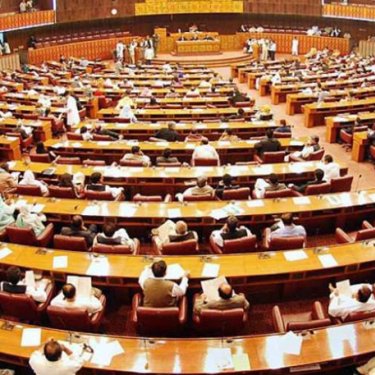Pakistan imposes new censorship mechanism under guise of protecting journalists

Reporters Without Borders (RSF) condemns the inclusion of an extremely vague section on conduct “obligations” in a law on protecting journalists that has just been passed by Pakistan’s federal parliament. Tantamount to censorship and intimidation, this section is unacceptable and must be withdrawn, RSF says.
The devil is in the details. Approved by the senate on 19 November, the “Protection of Journalists and Media Professionals Act, 2021” is supposed to provide an alert and defence mechanism for journalists who feel threatened in Pakistan, for years one of the world’s deadliest countries for the media.
But there’s a problem. Section 6 of this law neutralises virtually all the protection that it was supposed to provide when first announced by the government. This section prohibits all journalists and media professionals from spreading “false information” and producing material that “advocates hatred” or constitutes “incitement to discrimination, hostility or violence” – without clearly defining what any of these terms means.
The law allows the government to interpret these restrictions on journalistic freedom by arbitrarily deciding what constitutes “incitement.” Worse still, sub-section 3 of Section 6 says that journalists who fail to comply with these “obligations” will be subject to criminal prosecution.
Pointless law
“Even when defining a programme for protecting journalists, the government cannot resist introducing a provision that is clearly designed to intimidate and censor them, which means this is a pointless law,” said Daniel Bastard, the head of RSF’s Asia-Pacific desk. “We call on the staff of human rights minister Shireen Mazari, who submitted this bill, to present a new version without the absurd Section 6. At the same time, we invite Pakistan’s provincial governments to propose their own laws on the protection of journalists.”
This law’s adoption by the federal parliament follows the approval of a similar law by the southern province of Sindh’s parliament in Karachi on 28 May, which RSF and its partner in Pakistan, Freedom Network, hailed as a positive initiative at the time. This provincial assembly’s law includes no preconditions about conduct, unlike the federal law.
“Preconditions are not acceptable,” Freedom Network director Iqbal Khattak said. “This Section 6 must be taken back so that this law is not misused as is the case with the Prevention of Electronic Crimes Act, a law that is mostly used against journalists to suppress freedom of expression.”
“Sneaky agenda”
Opposition Senator Sherry Rehman deplored the way the government submitted the bill’s final version for a quick vote on a Friday (19 November). “Instead of sending bills to committee as is the norm, the government introduced a sneaky supplementary agenda right before Friday prayers,” she tweeted.
Media law expert Muhammad Aftab Alam told RSF that, as a result of Section 6, journalists wanting to benefit from the law would have to first ensure that their reporting satisfies “the government’s wish list.” The “vague and subjective requirements” on journalists in Section 6 could have been proposed for a code of ethics but have no place in a law, he added.
Section 6 is all the more incongruous in a law on protecting media personnel in Pakistan because journalists are usually the targets of physical violence precisely because they have dared to tackle subjects that are effectively banned by the government.
It was after drawing attention to the activities of local criminal groups and, in particular, the complicity they enjoy within the local government, that Muhammad Zada, a citizen journalist, was gunned down outside his home in Khyber-Pakhtunkhwa province on 8 November.
And Nazim Jokhiyo, a video reporter, was found beaten to death in Sindh province on 3 November after posting a video showing one of the hunting parties for a protected bird species that a local politician organises.
Pakistan is ranked 145th out of 180 countries in RSF's 2021 World Press Freedom Index.


